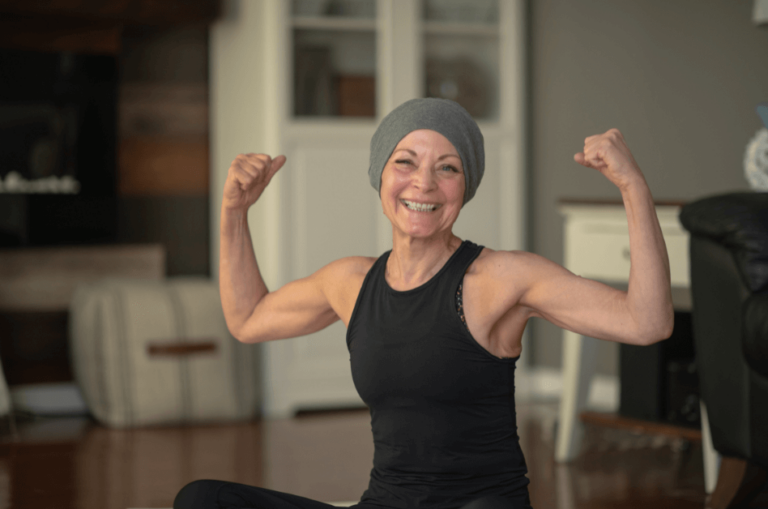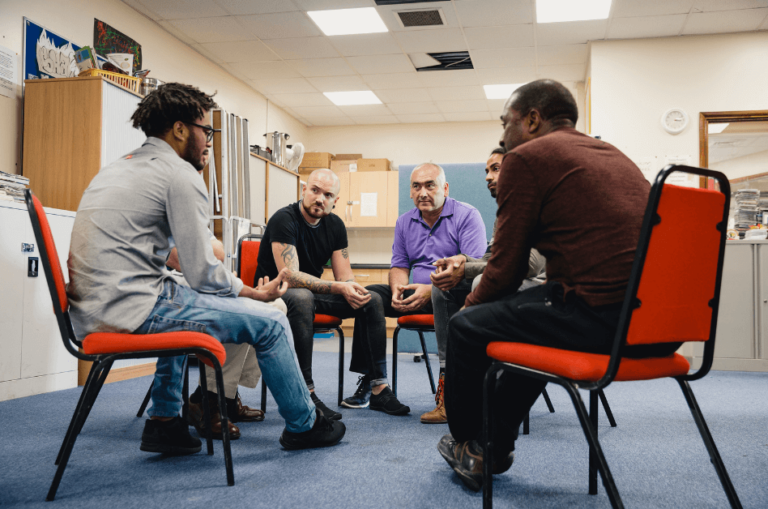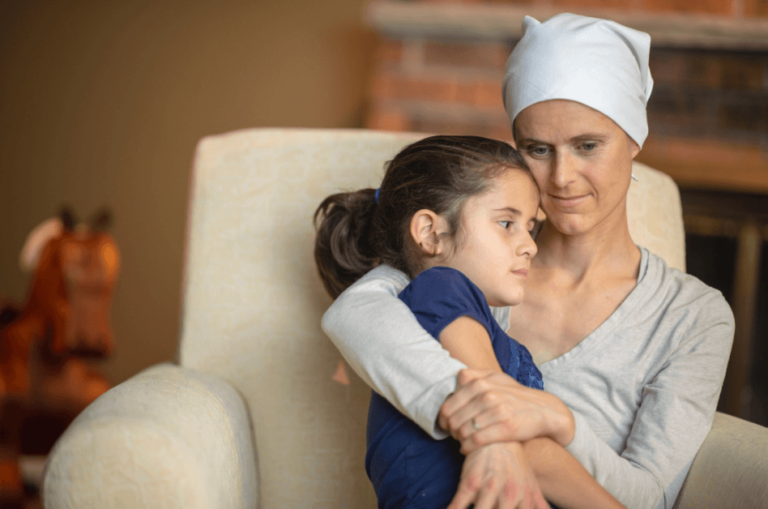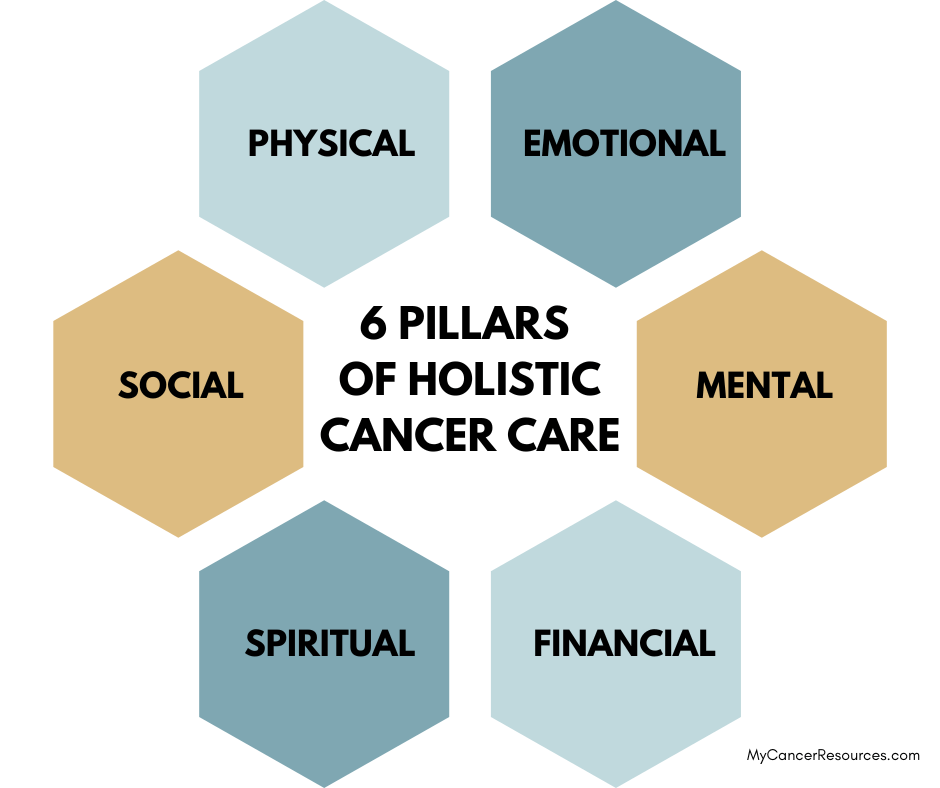The way I work with people with cancer and their caregivers is to use a holistic approach. Holistic is a term that means to look at the whole of a thing, and not just its separate parts. Holistic health care (and holistic cancer coaching) focuses on the health of your entire being.
This means that with clients, I look at what’s going on in all areas of their lives. When one area is out of balance, that can kick other areas of their life out of balance. A cancer diagnosis obviously shows the physical body is out of whack, but cancer affects all the other areas of one’s life too, and cannot be ignored.
I refer to this approach as the six pillars of holistic cancer care. This involves examining and working with each of the following areas (if the client is willing): physical health, spiritual health, mental health, emotional health, financial health, and social health. Holistic cancer care is personalized to fit each person’s needs and goals – it’s not a one-size-fits-all approach.
My evaluations always include a discussion with clients about each of the pillars and determining their interests and goals in working on each one. Of course, if a client isn’t interested in having me coach around their financial pillar and would rather simply learn about this by reading my finance-related blog posts, that is perfectly fine.
By being aware of, paying attention to, and strengthening each of these pillars of life, cancer patients can have more energy and stamina when dealing with cancer treatment side effects. Cancer survivors who continue tending to each of these pillars can help build their bodies to make it an inhospitable place for cancer to return. Cancer caregivers and other family members can also apply these six pillars of health to their own lives, increasing their ability to deal with the stress of caring for someone on a cancer journey.
Here are the six pillars of holistic cancer care.
Physical Health

The physical pillar doesn’t just focus on the specific type of cancer diagnosis. It also includes:
- Treatment options – the treatment plan you select along with your healthcare provider will have expected (and some unexpected) side effects:
– how will that therapy make you and your body feel?
– what can be done to prevent or minimize side effects, and
– what alternative or complementary therapies and/or palliative care
can be added to your routine to make you feel better? - Are your healthcare providers supportive if you choose to add complementary therapies?
- What clinical trials are available if regular treatment stops working?
- Physical activity – how can you move to keep your body strong? We all know how important regular exercise is for good health. But for people with cancer, some questions need to be considered:
– How can physical fitness exercises be modified for limited mobility,
or physical changes brought on by the disease, or lower energy levels,
or while recovering from surgery?
– Is physical therapy needed to help regain movement and strength?
– Once treatment is over, how can you make physical activity part of an
ongoing healthy lifestyle?
- Nutrition information – a balanced, healthy diet has long been shown to affect a person’s immune response, control high blood pressure or another chronic disease, and increase life expectancy. But it can be difficult to make lasting changes with what you eat. So let’s learn about what foods have been shown to promote best health and ask:
– What dietary changes should be made, such as cutting out sugary
foods, or increasing whole foods in your diet?
– Does your treatment center offer the services of a nutritionist or
dietician through an integrative medicine program that can closely
monitor your diet and run labs to check your blood work?
- Sleep – sleep is critical to your health. But cancer and its treatments can cause a number of problems with sleep: difficulties falling asleep, trouble staying asleep and problems getting enough restful sleep. It’s important to learn about what can be done to deal with sleep issues to make sure you’re getting plenty of it for your body to heal.
- Detoxing – chemotherapy drugs are very toxic, and radiation is too. What can be done to detox your system after you’ve finished treatment?
Spiritual

Spirituality isn’t about a certain religion or a specific belief system. Often, people describe spirituality as a sense of direction, purpose, or meaning in life. It doesn’t always go hand in hand with a specific religious belief.
A cancer diagnosis can lead one to question their faith, or ask ‘why me?’. It helps to discuss these questions with a coach that will support your belief in whatever higher power you believe in, and provide a listening ear and resources that can help you as you wrestle with things that you may have felt confident in and comfortable with before your diagnosis.
Some find comfort and peace and build their spiritual pillar by being in nature, by meditating, practicing mindfulness, or praying.
Mental Health

Another one of the 6 pillars of holistic cancer care is mental health. Maintaining mental strength while facing cancer or caring for a loved one with cancer can be really tough. Not only are you dealing with the everyday stressors of work, family life, etc., now there’s a cancer diagnosis and treatment to focus on. Life doesn’t just stop with cancer, it keeps going, and can add to the overwhelm you were already feeling.
Unfortunately, chronic stress can affect your immune system, making it harder to fight off cancer cells, so managing stress will be important. It’s a delicate balance to deal with the specific needs of your day-to-day life, but also preserve your strength for the days to come in treatment and recovery. To help with stress management, you can try:
- Practicing mindfulness, which is being aware and present in the moment. Not looking ahead or looking back, simply accepting where you are right then.
- Practicing breathing techniques that help you to slow down and halt racing thoughts
- Practicing self-care by participating in hobbies you enjoy or learning new hobbies that may be less active but still enjoyable when you need to physically rest more
- Setting healthy boundaries with people that bring you down or are toxic.
- Talking with your holistic cancer coach to create and implement a plan for mental health and well-being, which may include journals or workbooks.
- Speaking to medical professionals if medication might be needed for depression or anxiety.
Emotional Health

Emotional support is critical for a healthy life. Learning to identify and express emotions effectively to others is important in building up our emotional pillar. Ways this can be done include:
- Leaning on those people you’ve identified as your true support system, that you can count on during difficult times. Who can you truly be yourself with, expressing your anger (in a healthy way) or admitting your fears?
- Journaling can help you process your feelings, and looking back at previous journal entries can help you see how far you’ve come.
- Running ideas and questions past a cancer coach who can help you move through areas where you feel stuck is another option.
- Talking to a therapist who has completed special training in working with people with cancer and their families either 1:1 or in groups can make a huge difference in processing and expressing your emotions.
Though my background is in oncology social work, I do not provide therapy here at My Cancer Resources, but am happy to provide referrals if needed.
Financial Health

Cancer has many financial impacts:
- You may need to stop working while you’re going through treatment. This leads to a loss of income, maybe a loss of benefits, and sometimes having to empty out savings or college funds to pay the bills.
- A caregiver may need to stop working in order to provide care.
- The cost of treatment is very expensive.
- Medicine to combat the side effects of treatment can be expensive.
- Dealing with insurance companies is frustrating and exhausting, as is keeping up with all the bills from specialists, hospitals, etc.
- Some therapies you might be considering may not be covered by health insurance.
- Completing the paperwork for disability or other financial support may be confusing or overwhelming, especially if you’re already feeling run down from treatment.
A holistic cancer coach can offer money-saving suggestions, help you establish a budget or plan to pay off debt, provide referrals to places that offer financial assistance and provide guidance on completing paperwork for disability benefits, etc.
Social Health

Social support is critical, but only by the right people. You want true support by those who are in your corner, who will be understanding when you feel too sick to hang out, but will also call you out on it if you’re pushing everyone away.
The social pillar can be built up by:
- Attending a support group. Talking to people who have the same type of cancer, or who are going through the same kind of treatment, or who are also caregivers can make a world of difference in your quality of life. Many lifelong friendships are made in support groups. You can find some in person or online if you live in a rural area, don’t have transportation, or don’t feel up to leaving the house.
- Joining an online group coaching class, like the ones I’ll be offering. Think of these as a support group without the formal therapy piece, but where you’re still working on improving a piece of your holistic health.
- Spending time with family and friends. This can be anything from a quiet evening in, watching a movie or putting together a puzzle, or going out and hitting the town – whatever your energy level and interest is.
- Staying in touch with friends or family that are far away via text, email, snail mail and video chats.
- Joining the My Cancer Resources online community to connect with others facing some of the same challenges as you.
The six pillars of holistic cancer care include physical, spiritual, mental, emotional, financial and social health. Each plays an important role in your overall health.
Holistic cancer coaching takes all of these pillars into account, and looks at the whole person. Lifestyle changes in each of these pillars, even just small changes, can make a big difference in your everyday life.
If you’re interested in learning more about coaching to help you with each of these areas of your life, check out this post on how holistic cancer coaching works, read about the packages I offer, or reach out to ask a specific question not answered on those pages.
Medical disclaimer: The content on My Cancer Resources is provided for informational and educational purposes only, and is not intended as medical advice, or as a substitute for the medical advice, diagnosis or treatment by a physician or other health care practitioner.




